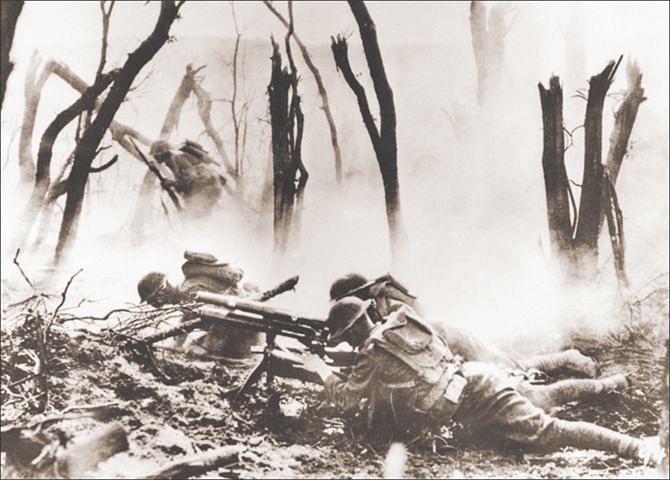THE GREAT WAR: A Distant View

How ironical, this use of the epithet “great” for things horrible. “The Great War”. “The Great Plague of 1665.” “The Great Earthquake of San Francisco.” We have “The Great Calcutta Killing”. But we Bangladeshis are hard to impress: the only event so far to observe the centenary of the start of The Great War here, as far as I know, is the exhibition of photographs of colonial troops in the conflict, mounted by the Alliance Francaise. Our history departments have other great things to think about. We take a distant view of the war; after all it happened a hundred years back, thousands of miles away.
Not as many Indians took part in it as in the other world war, which also brought the theatres of war close to home. When the country's major public university organises a conference on the subject, it is in the Department of English, and even there, I'm told, not without having to overcome murmurs of dismay. Specialists in ELT (English language Teaching) can't relate to anything literary or historical or philosophical; younger literature teachers are obsessed with the buzz words of the moment: it was “Diaspora” the other day, today it may be “Ecological Criticism”, or is it “Transgender Studies”? And yet, the very discipline of English (which does not mean ELT) owes its rise largely to the Great War, as do so many other things that constitute, for good or ill, the world we call modern.
The very word “modern” implies valorisation of change. Things used to be like that; but now they are different; the new is modern. “Modern” in fact is a modern word, coming into use after the end of the medieval era in Europe and the birth of the Renaissance. One order ending and another beginning evokes the notion of apocalypse, which now acquired a secular historiographic significance.
Darwinian evolutionary theory, Marxian economic philosophy, among other intellectual trends generated a ferment of apocalyptic ideas in the nineteenth century. Growing tension following Germany's unification and meteoric economic development led to presentiments of an impending conflict, and futuristic popular fiction depicted an Anglo-German war. What unfolded after the assassination of the Austrian archduke is therefore the chronicle of a war foretold. It came to be seen as the long-feared apocalypse.
What makes the Great War extraordinary is the intensity and duration of the conflict and the extent of its consequences. Not since the Trojan War have massive armies been locked in such a long-drawn conflict. Nor has any other war since inspired such an outpouring of literary and artistic works.
That is not all. Aspects of the modern world that we take for granted had their origin in wartime developments. The intelligence services, for instance, became powerful because of the war; both MI5 and MI6 were born during the war. Conscription was introduced for the first time in Britain. Passports became de rigueur because governments wanted to control the movement of people.
The fallout wasn't restricted to Europe. In fact, the Great War affected a larger area of land in the Middle East and around Asia Minor. The debacle of Turkey led to the creation of the nation-states we find in the Middle East today. It led to the promotion of Jewish immigration into Palestine. The Balkans provided another area for map-making exercises. These are developments that directly impinge on our lives.
The Great War, then, was the modern apocalypse. But one should ask at this point if it was the Great War by itself that played this role. I suggest that the Great War is inseparable from the Second World War. It is a truism that the uncertain and unfair peace that was imposed on the Central Powers eventually led to the Second World War. If we examine the ramifications of the effects of these two wars we will see that together they brought into being the world we live in.
The writer is Professor, Department of English, University of Dhaka.

 For all latest news, follow The Daily Star's Google News channel.
For all latest news, follow The Daily Star's Google News channel. 



Comments